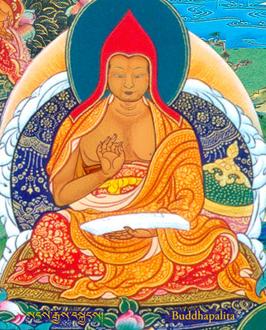Prasangika: Difference between revisions
Jump to navigation
Jump to search
mNo edit summary |
mNo edit summary |
||
| (10 intermediate revisions by 4 users not shown) | |||
| Line 1: | Line 1: | ||
[[Image:Buddhapalita.JPG|frame| | [[Image:Buddhapalita.JPG|frame|[[Buddhapalita]]]] | ||
The '''Prasangika''' | The '''Prasangika''' (Skt. ''Prāsaṅgika''; Tib. [[ཐལ་འགྱུར་པ་]], ''talgyur'', [[Wyl.]] ''thal 'gyur'') or 'Consequence' tradition is a subdivision of the [[Madhyamika]] school of philosophy. A defining feature of this approach is its use of consequentialist arguments (Skt. ''prasaṅga'') to establish the ultimate truth of [[emptiness]] beyond all conceptual elaboration. This approach was first explicitly formulated by the Indian scholar [[Buddhapalita]] and later elaborated upon and defended by [[Chandrakirti]]. | ||
[[Category: | ==Definition== | ||
In the [[Nyingma]] tradition of [[Mipham Rinpoche]] the Prasangika are defined as "followers of the Madhyamika who teach by emphasizing the [[uncategorized absolute]] that is free from all assertions".<ref>''dbu ma pa gang zhig rnam grangs ma yin pa'i don dam khas len kun bral rtsal du bton nas 'chad pa''</ref> | |||
==Notes== | |||
<small><references/></small> | |||
==Further Reading== | |||
*''The Svatantrika-Prasangika Distinction—what difference does a difference make?'', edited by Georges B.J. Dreyfus and Sara L. McClintock (Boston: Wisdom Publications, 2005). | |||
==Internal Links== | |||
*[[Svatantrika]] | |||
[[Category:Sanskrit Terms]] | |||
[[Category:Schools and Lineages]] | [[Category:Schools and Lineages]] | ||
[[Category:Philosophical Tenets]] | [[Category:Philosophical Tenets]] | ||
[[Category:Madhyamika]] | [[Category:Madhyamika]] | ||
[[Category:Mahayana]] | |||
Latest revision as of 13:51, 13 November 2020

The Prasangika (Skt. Prāsaṅgika; Tib. ཐལ་འགྱུར་པ་, talgyur, Wyl. thal 'gyur) or 'Consequence' tradition is a subdivision of the Madhyamika school of philosophy. A defining feature of this approach is its use of consequentialist arguments (Skt. prasaṅga) to establish the ultimate truth of emptiness beyond all conceptual elaboration. This approach was first explicitly formulated by the Indian scholar Buddhapalita and later elaborated upon and defended by Chandrakirti.
Definition
In the Nyingma tradition of Mipham Rinpoche the Prasangika are defined as "followers of the Madhyamika who teach by emphasizing the uncategorized absolute that is free from all assertions".[1]
Notes
- ↑ dbu ma pa gang zhig rnam grangs ma yin pa'i don dam khas len kun bral rtsal du bton nas 'chad pa
Further Reading
- The Svatantrika-Prasangika Distinction—what difference does a difference make?, edited by Georges B.J. Dreyfus and Sara L. McClintock (Boston: Wisdom Publications, 2005).